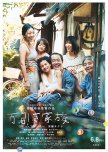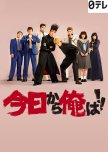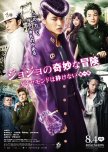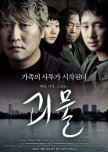
"Sometimes, it's better to choose your own family."
(I deleted my previous review because it was too verbose)Understated yet touching, fantastic performances especially in the last half hour, perfect casting, great direction, a close look at economic disparity within a modern and developed nation, doesn't glamorise poverty, balances both hope and bleakness, fully deserving of Palme D'Or IMO. A testament to love transcending biological relations, proof that a complete puzzle of family can be formed out of leftover pieces.
You should watch this one twice.
10/10
Was this review helpful to you?

P.s. as someone already pointed out, the theme song is a cover of 'Otoko no Kunshou'- https://www.youtube.com/watch?v=frC94k58Hvo - Jiro Sato, who played Riko's father, makes an appearance in this music video.
Was this review helpful to you?

3 Nen A Gumi: Ima kara Mina-san wa, Hitojichi Desu
18 people found this review helpful
This review may contain spoilers
If you want to change, now is the time!
Pros-At its bare minimum, 3-nen is a timely critique of cyber bullying, herd mentality and the damaging nature of false accusations, applicable to not only Japan but to those who inhabit online spaces or social institutions- so, everyone in other words. It demonstrates how on the internet, malicious, often fabricated rumours can spread like wildfire to life-destroying effect, and how the collective can mercilessly oppress the individual until they simply break. It is an important reminder that human-induced tragedies like suicide aren't the responsibility of one person but many; and that remaining complacent towards bullying is tantamount to condoning it. So really, the series itself can be described as a long and important lesson that directly implicates the viewer in its didactic purpose.
-Unlike its awful, conspiracy-based successor 'Nippon Noir', 3-nen succeeds, for the most part, in its twists and turns, creating an urgent, exciting plot that keeps you guessing. From the beginning, the stakes are set high and the moment that Hiraagi announces the doors are locked, you know that this series really isn't fooling around.
-Credit where its due, I like Shogo Muto's decision to make Hiraagi a former Tokusatsu suit actor/ stuntman. Not only did the screenwriter pay homage to prior series Kamen Rider Build (albeit in a rather self-important way), it gave reasonable explanations as to why Hiraagi is a skilled fighter, can handle explosives and is inspired to impart values of justice, empathy and personal change onto his students.
-Casting was a mixed bag, but there were standouts. Suda Masaki delivers, as usual, a compelling performance as the enigmatic Hiraagi. Suda bounces from from playful enthusiasm to merciless rage, and then to heartfelt sincerity with the flexibility of a rubber ball, though bordering on overacting as per usual. Nagano Mei's characterization of the class captain was realistic, especially in her emotions of fear and regret. Tomita Miu was a welcome presence in retrospect, but I do find problems with her inclusion (see cons). And who can hate Mori Nana?
-Liked the opening. The morning dance routine was pretty sweet too.
Cons
Having only watched 3-Nen, NN and KR Build I'm no connoisseur of Shogo Muto's work. But having watched these three and read about his other series, I must say that his writing isn't terribly cerebral, is it?
- For one, hackneyed cliches and plot devices rear their ugly heads. Terminal illness, well-timed fainting, bad boys with soft sides, bedridden mothers, unsympathetic and incompetent cops, misunderstood yet well-intentioned protagonists, unrequited crushes, fat people as comic relief, clinging to the hand of someone falling off a tall building... I could probably think of more on a rewatch. One or two aren't bad per say, the problem is when they start to accumulate.
-And while I mentioned that the series has timely social commentary, I hate how preachy and self-important it is. Hiraagi's long rants, brimming with metaphors about daggers in hearts and intercut with scenes of the students silently crying are insufferably sanctimonious. This forced, contrived melodrama defeats the moments of off-kilter humor and dark comedy that added some levity to the series. And subtlety? Hiraagi must have bagged it at the start or blown it up in the first explosion. Crying, screaming, desk-slamming and oh, I almost forgot that uh- cyberbullying is bad, empathy is good and that we are all pieces of trash. Perhaps Hiiragi didn't say it enough times. To my belief, effective social commentary is woven into a work, not necessarily with complete subtlety but with at least some degree of complexity. 3-nen throws it like an angry, self-righteous punch to the face.
-Some of the acting was awful, particularly from the students. One who comes to mind is the idol fellow who was playing the belligerent dancer who picks a fight with Hiraagi, but this may be because he had an annoyingly large amount of screentime.
-Belief has been suspended. Too many times. Normally this wouldn't be an issue but since this work is intentionally set in the present day and in the real world, its unfeasibility becomes somewhat of a problem. The series falls to bits under the slightest bit of scrutiny, and I don't feel the need to explain its questionable aspects because there are too many.
-I believe this is the third time that I've written this but I really do want to point out this show's hypocrisy. It rambles on about bullying but perpetuates it by making a mockery out of the token 'fat' character. Not cool.
I hate using the word 'overrated' but I hate hiding my convictions even more. 3-nen a gumi, while relevant and entertaining, is overrated. 6.5/10
Was this review helpful to you?

"Let's live together, the four of us."
If there is both hope and sadness to be found in the human condition, it is to be found in films like ‘Our Little Sister’. Nurtured by Koreeda’s empathetic and sensitive direction, it flourishes into showers of pink cherry blossoms and joyous smiles, evoking such rapturous beauty that you want to stay in the moment for just a little longer. But time moves on- the seasons change, the cherry blossoms fall to the ground and people say their farewells to each other. Through its harmonious balancing of dual aspects: optimism and melancholy, caring and abandonment, life and death, this bittersweet drama embodies the concept of ‘Mono no Aware’ (物の哀れ). There is vibrance and beauty in the existence of life, but it is also fragile, transient- under the watchful gaze of an old mansion and a giant tree, it blooms and fades away in the tiniest span of time. But ‘Our Little Sister’ emphasises- quietly but emphatically- that this is all the more reason to savor it in every moment, be it eating meals with your loved ones, feeling the sun streaming down on your face as you ride through a tunnel of falling petals or looking out at the grey waves after a funeral has passed.Moving away from this concept of ‘Mono no Aware’, Koreeda centres his drama on a fractured family unit and depicts how it heals-slowly- as the missing piece is filled by another. As he always does, he “turns the camera into a window” (to quote Brian Tallerico), capturing both the ups and downs, and the larger joys and tragedies with a masterful lucidity. I’ve already waxed lyrically on Koreeda’s other films so there isn’t much left for me to say as it ticks all of his boxes- damaged families, slow pacing, food scenes, passing trains, etcetera. One interesting thing that I would like to point out is how the composition of the (matriarchal) household has changed in the absence of the father and mother. Sure there are three sisters, but Sachi is ostensibly the mother-stern yet kind- while Yoshino and Chika are like unruly children. When Suzu enters the household, the two middle sisters move up the totem pole, resulting in the youngest sister being doted on as both a child and a little sister. And only when their real mother enters the picture are we reminded that Sachi is, herself, a daughter- even if her childhood was unwrought by the folly of adults. In depicting the shifting of familial roles, as he did in ‘Nobody Knows’, Koreeda provides a testament to the strength and adaptability of children (through three of them have grown up). Trauma may have shattered their lives, but through their shared companionship, they slipped back into the flow of life. Time spent together hardened and solidified the bonds between them, and having confronted and moved on from the past, their scars began to fade away.
The main deviating factor of ‘Our Little Sister’ from Koreeda's filmography is its soundtrack. Foregoing Gontiti's melancholy guitars or Bach's variations, Koreeda instead chooses a lush and sweeping orchestral score by the talented Kanno Yoko- a perfect complement to the scenic coastside setting of Kamakura. It seems not everyone liked this soundtrack, with some reviewers complaining that it is excessively sentimental, syrupy, sickly-sweet, something else with sibilance. However, I think that there is nothing wrong with it due to how this film is (intentionally) more of an audiovisual feast than Koreeda’s others. Similarly, the soundtrack could be accused of broadcasting the intended emotions too ‘obviously’, betraying Koreeda’s tendency towards the implicit and objective. But since the film doesn’t veer into being excessively sentimental or melodramatic, I don’t see a problem with this. In short, the soundtrack is excellent, and it is streaming on spotify and apple music for your listening pleasure.
A large part of this film’s popularity is presumably due to its ensemble cast, all of whom performed excellently. Ayase Haruka and Nagasawa Masami, both mainstream stars, conjured forth their inner talent to give naturalistic, high-caliber acting. Kaho, in a far cry from her darker roles, was great as the goofy Chika- though I still found it hard to erase the memory of her as the blood-soaked vampire warrior K from 'Tokyo Vampire Hotel'. Suzu, then a newcomer, clearly had some measure of uncertainty- but this was perfect for her character, whose wide eyes radiated sincerity and later, well-earned happiness. Other names with considerable mainstream fame- regulars Kirin Kiki, Lily Franky, Kase Ryo, then Suzuki Ryohei, Sakaguchi Kentaro (in a subtle ‘Ore Monogatari’ reunion), Tsutsumi Shin'ichi, Fubuki Jun, Otake Shinobu (the mothers from ‘Soredemo Ikite Yuku’) and so on- also contributed to the vast stirring pot of talent. Another special mention to Oshiro Maeda, then a young lad, who I hope to see in more of Koreeda’s future works.
Compared to his other work, ‘Our Little Sister’ isn’t regarded as strongly by critics. It was apparently disparaged at Cannes and critics have looked down their noses at it, labelling it as “decidedly middle-brow”, “Kore-eda lite”, “frictionless” and worst of all, “boring”. To which I say that they’re just snobbish, pretentious and a bit too jaded. This film isn’t meant to be dark, conflicted, fraught with emotion. It is meant to be a feast for the senses and for the heart- and to that end it succeeds, leaving viewers emotionally satisfied and with just a tinge of wistful sadness. 8.5/10
Was this review helpful to you?

"Bye-bye!"
(JFF Sydney 2019) Hakota Yuko's debut film centres around the coming of age of a disillusioned career woman undergoing a quarter life crisis.Sunada Yuka's loneliness and repressed discontent are interwoven into the fabric of the film and are a testament to how unhappiness doesn't have to stem from external circumstances; after all, Sunada has a well-paying (albeit patronizing and insecure) job, a comfortable house and a nice husband. The moral tonic at the core of the film is simple and universal but of high importance; that only by relinquishing emotional burden can we confidently face the future and establish control over our own lives. To detest sentimentality (or 'tackiness', as Sunada calls it)- by looking on our pasts with shame or regret, and refusing to reveal our vulnerabilities to others is to invite the hardening of our hearts and the accumulation of a discontent that can't be quenched by beer, loud karaoke and adultery.
My only complaint about the film is that the progression of the story at times was uneven and a bit jolty, especially during the road trip to Ibaraki. Sometimes it has a tendency to awkwardly drift for a bit. Overall, though, it felt very well integrated with symbols and motifs used cleverly throughout. Among these was the titular Blue Hour- a liminal period of time that reflected both Sunada's state of transition and her subconscious wistful feelings towards the childhood that she tries to banish from her mind. Another nice touch was the focus on flowers, which I took as another potential symbol for Sunada's situation- cut off from their origin stem, they initially seem fine immersed in water, but can only survive so long before they start to wilt.
The ending seems to have generated mixed opinions but it is certainly one of the best I've seen to date in a film. The final twist ties everything together so well, and adds a note of sadness when one thinks about the film in retrospect. I doubt this review is going to be read but I advocate for anyone who has viewed/ will view this film to think upon the implications of the ending, as Director Hakota encouraged me to do so when I asked her about it in the Q and A.
Someone at the screening made a comparison to Hirokazu Koreeda's style of filmmaking and I think there is merit in this. Much of what the film is trying to convey is created without words- rather, through awkward silences, physical gestures and the occasional but powerful outburst of raw emotion. I've stated this all too many times, but Kaho (who gives one of her best performances here) really proves her prowess when given complex roles- she displays powerful emotions that aren't necessarily given the chance to fully surface, but they are ever present and when they do surface, it is with heartfelt poignance. It would be a crime not to commend Shim Eun Kyung for utterly nailing her character despite Japanese not being her main language- Kiyoura was the perfect foil to Sunada, and Eun Kyung's infectious sense of delight helped alleviate the often melancholy mood. Kaho and Eun Kyung had fantastic chemistry, which was a given as Director Hakota mentioned that the three of them had spent a lot of time off-set together as well.
The other performances were also amazing, notably from every member of Sunada's odd and somewhat dysfunctional family. The country bumpkins were brought to life, not as morally upright contradictions to Sunada's resentment, but as people just as flawed as Sunada herself. Sunada's brother (Kuroda Daisuke) was a highlight because of the dark humor he provided in his few minutes of screentime- there was clearly something wrong with him but he was still funny nonetheless.
For anyone who has parents/grandparents that they've come back to after a long time away, this film is bound to be highly relatable. For anyone else, this film is still a must watch... if you can somehow track it down. Hopefully it sees a wider release in English by some chance. Let's hope that Director Hakota's next release is just as good.
Was this review helpful to you?

Jojo's Bizarre Adventure: Diamond Is Unbreakable
6 people found this review helpful
"What did you say about my hair?"
In terms of live actions, you could do worse than Miike Takashi's 2017 remake of this popular manga/anime season. The special effects are quite decent, the costumes don't look too low-budget, the storyline is, for the most part, faithful to its source material, and it may be worth watching just for the ensemble cast alone. But despite some interesting alterations by Miike- the decision to film in an old Spanish town, of all places, and the portrayal of Stands as cybernetic ghosts- this film is just dull. Unless a director is shooting for a 'so bad it's good' type of comedy, it seems difficult to make a genuinely good live-action out of a source material that isn't grounded in reality- JJBA being a key example. Miike didn't capture the playful and dare I say 'bizarre' nature of the source material, opting instead for a hardboiled action movie with fantasy elements. As a result, the costumes and dialogues are, for want of a better word, cringe despite the best efforts of the notable cast. Theres simply no way that the lanky Yamazaki could have portrayed an ultra-buff 16 year old half-Japanese teen, and despite his short stature the 20-something Kamiki was about 20 centimetres too tall and 8 years too old to play Koichi. The film also drags and stagnates during key moments, which just seems counterintuitive to the energetic, fast-paced source material. With the film's lack of financial success, there won't be a second part. Which is a shame because I would've liked to see Yoshikage Kira and Shigechi in LA form.Was this review helpful to you?

"This is my happiness."
Pros-As one might expect, 'Hitori Camp' is an upbeat and stress-free series that is relaxing to watch. The anguish that one might obtain from watching J-dramas is nowhere to be found.
-This series could easily be labelled as an unconventional comedy; every episode is a wellspring of amusement. Unlike most J-dramas, which rely on slapstick or wordplay, the humour in 'Hitori Camp' comes from odd camera angles, wacky scenarios that are presented understatedly, and just a bit of schadenfreude. The scenes where Nanako talks to herself or role-plays in pursuit of her ingredients are particularly hilarious. She's a bit like Sid from 'Toy Story' but not sadistic and bratty.
-The guest roles are all memorable, with each of the minor characters leaving their mark by imparting lessons onto the two protagonists. Towards the end of the series, they also get more screen-time and some of their personal stories are quite touching, especially in the penultimate episode.
-Kento and Nanako are contrasting but interesting and likeable protagonists that you learn more about as the series progresses. Miura Takahiro and Kaho deliver natural performances, realising Kento's haplessness and Nanako's eccentricities. Filming this series must have been a change of pace for them.
-It is satisfying to see the protagonists' adventures culminate in a self-prepared dish. I don't know whether it is Miura and Kahos' acting or their genuine enjoyment, but you can really feel their enthusiasm as their scarf their efforts down, mostly with a bit of alcohol. Whether the food came from a river or out of a can, it is clearly a source of pride to them.
-Lovely and homely shooting locations. Whether the site is by the sea, amongst the trees or even in the comfort of one's home, 'Hitori Camp' makes it clear that you don't have to be in the midst of the wilderness to experience the pleasures of camping.
-Nicely minimalistic soundtrack, interspersed with some classic Japanese songs that the protagonists absent-mindedly sing as they go about their activities. The theme song, 'To the moon' by Yogee New Waves is worth another listen. https://www.youtube.com/watch?v=UPs6EjmDE38
-While not the focus, the series does take some time to comment on the nature of loneliness and what effects it can have.
Cons
-Kento and Nanako never appear in the same episode. Hoping for a future special where the two meet and prepare a combined meal of canned and foraged food.
-Some of the food didn't look very appetising TBH, but this complaint is minor as its more about the journey (and the friends made along the way) than the destination. Unlike 'Yuru Camp', this series doesn't have the creative luxury of glamorising simply-prepared meals made with a camping stove and portable utensils.
Verdict; A relaxed and funny slice-of-life that is visually pleasing and suitable for all demographics to watch.
Was this review helpful to you?

A monster movie that devours its competition
The titular monster of 'The Host' starts off as a fish before mutating into an oversized amalgam of animalistic traits. Claws that have smaller claws attached, a serpentine body, a multilayered maw full of teeth and a prehensile tail. When it first attacks, it lumbers head-on like an enraged bull, but it is also capable of deception, striking from the shadows and swinging from overhead beams like a demented acrobat. Despite how its CGI is dated, the monster is not only grotesque and frightening but captivating and amusing. Much of this can also be said of 'The Host' as a movie. By definition it is a horror movie but under Bong Joon-ho's direction it morphs into dark comedy, family drama, tragedy and most notably, a barbed political allegory. Unlike the CGI, this allegory remains frighteningly relevant, even to- no, especially in this day and age.Director Bong's satirical attack is two-pronged. The film is known widely to be a critique of America's continuous presence in South Korea. The opening scene of an American doctor forcing his South Korean colleague to pour formaldehyde in the Han river was closely inspired by an uproar-causing real-life incident, and this notion of insidious poisoning leaves little to the imagination. As does the toxic chemical agent 'Agent Yellow', which evokes a fairly recent example of American Imperialism in Asia that ultimately caused more harm than good.
What is scarily applicable to the entire world, however, is the film's depiction in portraying government incompetence; both at preventing disasters and handling them. An unfortunate number of viewers have derided this film for showing its monster 'too soon', but this seems to be the point. The government knows that chemicals are mutating the fish in the Han river, they know of rumours that their irresponsibility in letting the Americans take charge is creating a literal monster- but they do absolutely nothing. The people, without the government's warning, behave likewise- they see the beast hanging like a fruitbat from a bridge, they throw snacks at it, and they only take action when it starts devouring them. Too little, too late. Rather than making amends and assisting the victims of the disaster, the government focuses on preventing their own fall by spinning a web of lies and red tape, and using the 'infected' as quasi-scapegoats on which to deflect public blame. This tragic process has been seen time and time again in human history- most recently, with a certain pandemic that starts with 'c' and rhymes with 'coronavirus'. It is Bong's ability to spin such a relevant allegory while creating a scary and fun movie that makes him such a fantastic director- hence why this film is just so brilliant.
Brilliant, but not perfect necessarily; the film's middle act drags slightly without a monster to chase it, though its more human emphasis helps build the political allegory.
The main characters in this film were highly likeable, both in their humorous family dynamics and their steely determination to take things into their own hands. They were buoyed by the film's venerable cast. Song Kang-ho was particularly memorable as the narcoleptic Gang-du, whose dimwittedness was matched only by his unyielding devotion to his daughter and his blubbering, sincere desire for his despair to fall on sympathetic ears. Ko Asung, then a child actor, delivered an endearing performance that packed both heart-stopping fear and resourceful bravery.
The monster scenes, especially the wild chase at the start, are some of the best that I've seen and were often unexpectedly hilarious. I also enjoyed seeing how the Park family took on the monster with largely scavenged weapons; signs, old Winchesters, bows and molotov cocktails.
The theme song of 'The Host' perfectly captures the film's prevailing mood; not terror, but amusement with a melancholy tint to it.
https://www.youtube.com/watch?v=6icONTC43dI
9.5/10
Was this review helpful to you?

This review may contain spoilers
"The one who was laughing at me... the one who thought I was embarrassing... was me after all."
Firstly, some thoughts from my initial viewing. "Shino-chan wa jibun no namae ga ienai" is a film that stings with how relatable it is; not just to those who've suffered speech impediments, but to all those who are insecure and lack a place in the world. The pain of rejection, casual cruelties, and frustration at oneself isn't soothed by tactless words of encouragement, nor is it truly defeated by the kindness and empathy of others. Shino runs and runs away, whether it is on her two feet or by fruitlessly attempting to circumvent her stuttering. Even when Kayo chases after her and Tsuyoshi attempts to make remands for his teasing, she deflects their understanding behaviours. Alone and having realised that Kayo's faith towards her has never wavered even as the latter was abandoned, Shino discovers the key to 'say[ing] her own name'- expressing herself to the world. Or rather, that the lock which prevented her inability to express herself didn't just exist within her mouth, but also her mind; through her own perceived inadequacy and dare I say, self-loathing. An idiom comes to mind; "You can lead a horse to water but you can't make him drink". Perhaps it should be reworded for this context; "You can give a student a stage to stand on but you can't coax the words out of her mouth."Then, some pros and cons.
Pros
-Quite a lot is left to be inferred by the viewer; for example, why Shino avoids Tsuyoshi even after he amended for his crude behaviour AND she gave the green-light for him to join Shinokayo. Why Shino seems to suddenly demolish the progress she had made in the first half of the film and regresses into her antisocial shell once more. Why what appears to be a feel-good film has a slightly heartbreaking conclusion.
-Realistic characters; everyone presumably has at least one of them in their lives. The attention-seeking clown, the one who is sullen yet secretly kind, the well-meaning parent and teacher who are defeated by their lack of empathy, the one who is mocked and pushed down for a flaw that they were born with. Touchingly, the main trio are all connected by their insecurities and their desire to belong.
-Appropriately bittersweet (but ambiguous) ending. Adachi Shin didn't give viewers what they wanted; to see Shino and Kayo perform together again (possibly with Tsuyoshi on his tambourine). And sadly, that's how friendships often turn out. Ties that are severed won't repair at an instant, let alone at all. Kayo never got to see Shinokayo fully materialise, Tsuyoshi couldn't even be "that one guy in the back" and Shino never acknowledged his apology. Even though the perfect worlds that the three characters envisaged were unattainable (the three are alone in the end and Shino's stutter hasn't vanished), steps have been made in the right direction. That's life, isn't it?
-Deliberately imperfect but endearing musical scenes. Shino's off-key yet joyous singing voice and Kayo's inaccurate yet determined guitar strumming seemed to meld so well together. This odd sense of harmony seems to be a metaphor for the necessity of friendship to draw out one's potential.
-Very fine acting and chemistry. Despite their young ages, the performers pulled their weight to deliver moving, layered performances. Makita Aju in particular was just amazing.
Cons
-May be a pro for some, but the film winds up moping for longer than is comfortable or necessary.
-(Also a pro) but how stuff is left for the viewer to infer. I watched this to unwind and ended up feeling more agitated by the end. Sometimes you just want a film that explains everything clearly to you. This ain't it, chief.
-The happiness and sadness in this film seem to alternate until the bittersweet ending. They could've been blended more thoroughly throughout the entire film.
A moving and realistic film overall.
Was this review helpful to you?

Yagira Yūya had about three or four lines in total but he was absolutely incredible in the most disturbing way possible. Suda Masaki and Komatsu Nana over-acted in some instances but they played their roles with a near-despicable prowess. If you don't like seeing a lot of blood this might not be the best film to watch to wind down.
(SMH people shouldn't instantaneously give a film a poor review without considering its purpose)
Was this review helpful to you?

"Adults keep secrets".
'Quartet' is a truly fantastic series that plays out in a similar manner to a well-composed musical composition. There are conflicting motifs of trust versus betrayal, truths versus lies and dreams versus reality, spun together with friendship, secrets and unrequited love.The four protagonists are excellently characterised. As with their instruments, they each shine individually, during one-on-one conversations and when they're all together. It was great how over the series, you don't stop learning about their pasts, their families and friends and the secrets they hold within them. The charisma of each character and the allure of their rapport are in no small part to the amazing performances and chemistry of the exceptional actors and actresses; Matsu Takako, Matsuda Ryuhei, Takahashi Issei, Mitsushima Hikari are four legends I won't forget. Seriously, the acting is some of the best I've seen in a J-drama so far, and they have to be applauded for making an effort to look as if they are actually playing their instruments. The dialogue is masterfully produced. Aside from being witty and feeling very natural, seemingly small remarks and humorous situations often take on overarching significance that tie into the themes of the series. Clever metaphors, symbolisms and double meanings are also planted generously through each episode, making one feel rewarded for paying attention to them. There are enough excellent quotes to fill up a small notebook.
The locations used were well chosen, endowing an intelligently written series with aesthetic value as well. The town of Karuizawa was beautiful, especially in winter, and the villa and restaurant had a cozy, homely feel to them. While there could've been more variety, I love the selection of classical pieces, especially the quartet arrangement of Smetana's "The Moldau". The BGMs are pleasant but the ending song, along with the lavish music video, are absolutely incredible. The food looked nice too. A nice bonus was seeing Kankuro Kudo act (which he is also good at).
'Quartet' doesn't limit itself to a singular mood. Sometimes it wants you to laugh out loud. Sometimes it wants you to feel awkward and slightly creeped out. Sometimes it wants to move you to quiet anger, and sometimes it just wants to make you feel warm inside. For me at least, it got me every single time.
Was this review helpful to you?

Was this review helpful to you?

This review may contain spoilers
Kamen Rider Drive was a great series that had cool suit designs, a unique transformation device AND rider machine, and an energy-filled theme song. Tomari Shinnosuke and Mr. Belt were highly likeable and reflective of the series as a whole- sometimes light hearted and comedic, at other times dead-serious and intense. Likewise, Kiriko, Go and Chase, especially Chase, were all excellent characters with dark, but interesting, backstories.What also struck me about this series were the Roidmude, particularly the main trio- initially appearing to be cruel killing machines, their backstories painted them as being sympathetic and nuanced- androids made to feel pain and suffering, yet treated as objects to be abused and disposed of by their owner. Thus, they were some of the better Kamen Rider antagonists that I've seen.
My main complaint with the series is that, approximately until the reveal of Chase's identity, the series seems to trundle along in a monster-of-the-week type way and seemed fairly uninteresting, to the point where I dropped it for about two months before tentatively starting it again. The first 15 or so episodes required a bit of patience to get through. That being said, the story really shifts into top gear after this, so don't be discouraged.
All that's left to say; "Nice Drive!"
Was this review helpful to you?

The chemistry between the family members feels quite genuine, and the performances were commendable overall. It was sweet how Harumi referred to Mitsuru as a big brother rather than an uncle.
I loved the analogies used to describe Mitsuru nii-chan e.g. as a lion in a zoo or as a Roomba cleaner, and how the series continued to reference them later on. The ending was foreseeable and slightly bathetic but still felt immensely satisfying. Can't say I was satisfied with the execution of the romance arcs, however.
As the title suggests there is a lot of talking. There are also a lot of mouth-watering food scenes.
Was this review helpful to you?

This review may contain spoilers
“You never really understand a person until you climb in his skin and walk around in it.” A.F
**Minor Spoilers**'Switched' takes the oft-used concept of the body swap and gives it a cruel twist: the 'beautiful' girl gets the short end of the stick despite having done nothing wrong, while the 'ugly' girl that appears to win it all is callous and selfish. What follows is a simple but well-made parable on how envy causes more harm than good, how real beauty isn't only skin deep- and how it takes just one kind friend to pull you out of despair. But the linchpin of the series, in my opinion, is the way it shows that true ugliness is created from the internalisation of cruelty and mockery. And this true ugliness? All-consuming hatred, a self-propagating force that eats away at everything (yourself included) and pushes others even further away from you. This naturally causes you to hate yourself even more and closes the doorway of hope- until shrouded in the darkness of your mind and standing under the crimson moon, you stare in anticipation at the streets far below. Yikes. Though I included Atticus's quote because of its relevance towards empathy, it only applies to Ayumi, truth be told. Zenko, on the other hand- she may walk around in Ayumi's skin, but as her mother points out, she is still the same hateful, spite-filled girl within.
Notes:
-Six episodes was just the right length.
-One might say that the symbolisms used, e.g. birds representing freedom, each girl seeing their true self in mirrors, were too on the nose. However, I don't see this as a problem because this series is intended to be accessible and easy to understand rather than esoteric. The fact that the series even has symbolism which it uses to further its didactic purpose is rarely even seen amongst J-dramas, to be honest.
-The production value was clearly a cut above the average J-drama, in no small part to the Netflix funding. It was thoroughly refreshing, a blast of fresh air even, to watch a Japanese drama that didn't look as if it was filmed and produced by an amateur crew with a bad camera.
-Acting was very strong from rookies Kiyohara Kaya and Tomita Miu, (who gets a role that doesn't boil down to 'ha-ha fat person funny'). They succeeded greatly in not only playing duel roles but characterising each role with pinpoint accuracy- pulling off Ayumi's sweetness and Zenko's homicidal finger-biting equally well. Kamiyama Tomohiro and Shigeoka Daiki also did quite well, although I do question the typical high-school series/movie trait of having two men in their mid-twenties play students almost ten years younger. I admit that Shigeoka, as the endearing Kaga, triumphed thoroughly in channeling his grinning schoolboy.
-Soundtrack was good but a bit kitschy and sparkly.
-If I had a complaint besides all the slow-mo's and awful 'splat' noises for when the bodies hit the floor, it would be the excess of love-triangle shenanigans when the series could be delving further into its social issues. It would be a truly excellent series if not for these flaws, but I do understand the need to add sugar to make a dark series palatable for its young audience.
As it stands, it is one of the finer J-dramas and dare I say, a much better examination of bullying than the hypocritical 3-nen A gumi (where, might I add, Tomita was used solely for the purpose of comic relief based on her weight).
9/10
Was this review helpful to you?























